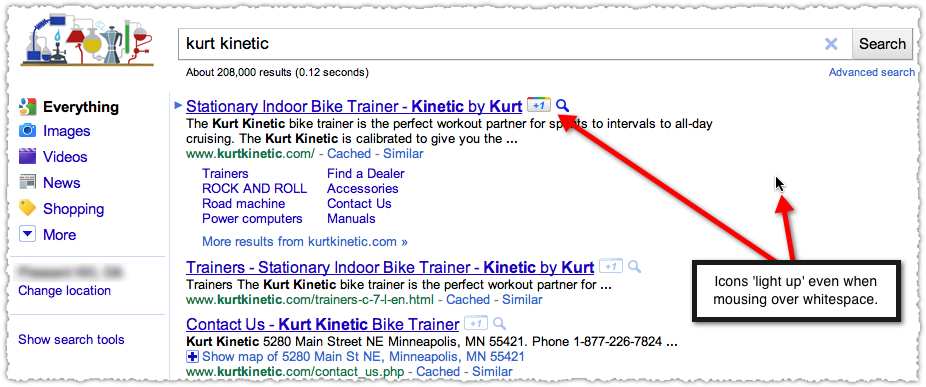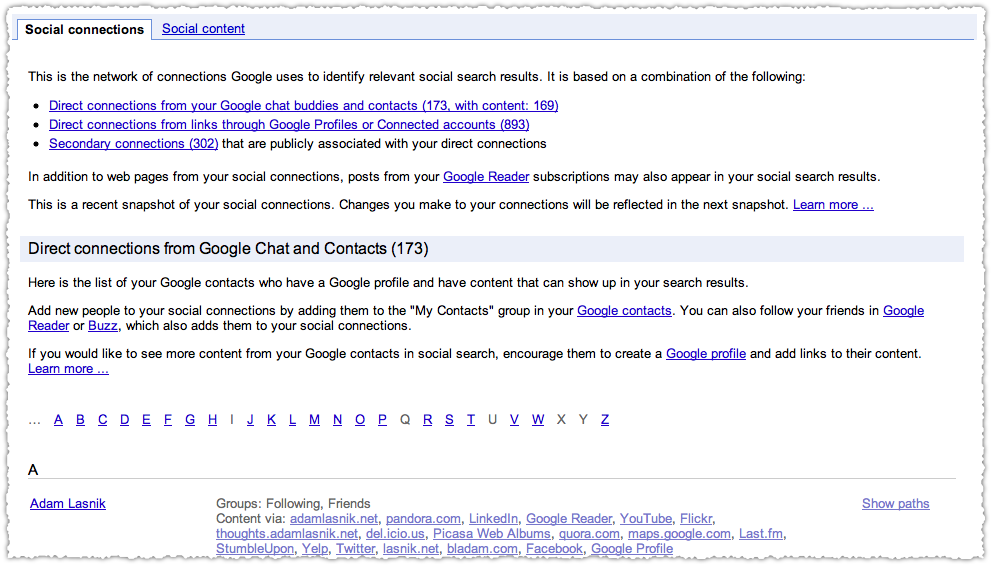Yesterday Google launched Google +1. After firing up Haircut 100 and reading Danny Sullivan’s review I sat down and gave Google +1 a try myself. Here’s what I learned and why I think Google +1 is the start of a war for social data and your attention.
![]()
What is Google +1?
Google +1 delivers a new set of social search results based on explicit recommendations from your social graph. Right now, those recommendations are made by clicking the +1 button next to a search result – both organic and paid.
In the future, users will be able to recommend content from sites that present the +1 button. At that point, Google +1 will behave similar to a Facebook Like.
All +1s are aggregated and presented on a +1’s tab on your Google profile, which begins to look like a social networking platform.
Google +1 User Experience
Google +1 is a heavy feature on the page, with the icon appearing next to every result on a SERP. Do we really need more to look at? The +1 icon (and instant preview icon) will animate and ‘light up’ as you mouse over any part of that search result.

These features have nothing to do with each other yet they are presented to the user by the same action. I understand these are ‘actions’ a user can take on a search result but I’m not sure that’s intuitive.
Will the mainstream user even grok the +1 nomenclature? I do, but will the mom in suburban Omaha? Facebook was brilliant in using a term and icon that was instantly recognizable.
I also find the +1 mechanism strange in search results. Am I supposed to search, visit a site and return to the SERP to +1 that result? If search is about discovery, how would I make a judgement on a search result before visiting that site? Am I supposed to search for a whole bunch of stuff I already like so I can +1 those results?
If Google wants to put +1 in search results I think it makes more sense to model their block sites feature that only activates after I’ve visited a site and returned to search results. Alternatively, Google could use web history and only present a +1 option for those pages I have visited.
In the end, it’ll make a lot more sense when there are Google +1 buttons on websites and the search results reflect the +1 count from that page.
Google +1 Social Data
We all know that the link graph is a mess and that Google is seeking other ways to measure trust and authority. I don’t think the web of links will die out altogether but it certainly needs to be augmented with the web of people.

I don’t think Google wants to rely on Twitter and Facebook for such an important and emerging part of understanding web behavior. Twitter has been civil but the frog boiling of their developer platform is ominous. Facebook has been outright hostile and recently took steps to hide even more web content from Google.
Social signals matter and Google +1 gives Google their own explicit source of social data.
Google +1 allows Google to mine both your personal social graph (your friends who have +1’d items) but also the +1 graph (the popularity of an item based on all +1 activity.)
One has to believe that Google profiles will become some sort of social nexus where further meta information can be attached to +1s. Today it’s a simple list of +1 pages. Tomorrow I might be able to comment on your +1s or Yo Dawg your +1 by giving it a +1. Social proof, curation and the wisdom (or not) of crowds could rise in importance.
As Google begins to look at the +1 data, they may be able to find individuals who have more influence. Not just overall influence but influence for a specific topic.
This means that over time Google could weight a +1 from one individual on a sliding scale. A +1 from yours truly on an SEO site might carry a lot of weight, while a +1 from me on a knitting site might carry little weight.
By mapping topical influence, Google may be able to avoid +1 gaming.
Google +1 Personalization
What does this mean for search and SEO specifically? Google +1 may change the nature of search personalization. The difference between a standard result and a personalized result could get bigger and that would be an interesting SEO development.
Right now, Google’s personalization doesn’t disrupt traditional SEO. Google (and a many SEOs) talk about it a lot and they have increased the number of queries they personalize, but the personalization is still rather subtle in nature. A result might move up and down a place or two, but not from the top of page 1 to the middle of page 2.
Google +1 might change that. Search results could behave more like Facebook’s EdgeRank, which radically changes what each individual sees and experiences.
Google +1 Attention
Google +1 makes Google less reliant on competitors for social data and should help them improve search results. But is that really Google’s only goal?
In order to +1 things, you first need a public Google profile. This helps people see who recommended that tasty recipe or great campsite. When you create a profile, it’s visible to anyone and connections with your email address can easily find it.
Your +1’s are stored in a new tab on your Google profile. You can show your +1’s tab to the world, or keep it private and just use it to personally manage the ever-expanding record of things you love around the web.
Google profiles could enter the war for user attention, currently being won (handily) by Facebook. People spend enormous amounts of time on Facebook, and that’s dangerous since it’s only a matter of time before Facebook becomes a real search competitor.
We’ve seen Google redesign Google profiles and got a glimpse into future social connections like FourSquare and Github. Google profiles contains rich feeds of information from Buzz, PicasaWeb and +1. Google has also paid close attention to privacy, learning from their mistake with Buzz. It all adds up to making Google profiles a true destination for social information.
Google could claim some level of success if Google +1 slows the adoption or ubiquity of Facebook’s Like button. Fracturing Facebook’s hold on attention seems like the end game.
Google +1 and Circles
Take a spin over to your Google Dashboard and you’ll find the (no longer) mythical Circles feature.

Click on View social circle and you get an idea of how far along Google is on their social product.

Google has constructed their own social graph and are now building features and user facing tools on top of this expanding data structure. I’d argue that +1 is a data feed to further support a still emerging social networking product.
Will Google +1 work?
Google does not have a good track record when it comes to social, including SearchWiki, Stars, Wave and even Buzz.
The current search interface for creating and viewing +1s seems clunky and the entire visual field seems both too saturated and nebulous at the same time. But I’ll hold judgement until +1 buttons show up on websites. It’s then that mainstream users might better understand the functionality.
From a search quality perspective, I believe results could get better, but it’s not a fait accompli. The integrity of a user’s social graph will be paramount. How large is that social graph? Does it contain strong ties or weak ties? Which nodes in a social graph are more meaningful or influential? (e.g. – a +1 from your best friend might mean more than a +1 from someone you met once at a conference.)
Facebook is ahead of the game here with their EdgeRank algorithm. Google will need to further develop their own to make personalized search successful.
If Google really wants to take this to the next level, make a +1 bookmarklet (or bundle it with Toolbar or Chrome for wider use.) That way I can +1 sites and pages that don’t have the button on their site. This would expand the reach of social search beyond just those sites savvy enough to implement the buttons.
At the end of the day I think Google needs +1 to work, if for no other reason then to have an independent source of social data. The war for social data and your attention may have begun in earnest.
The Next Post: Google Preemptive Penalties
The Previous Post: Link Gardening

6 trackbacks/pingbacks
Comments About Google +1 Analysis
// 6 comments so far.
Rick Bucich // March 31st 2011
AJ –
You’re right on here: “I also find the +1 mechanism strange in search results. Am I supposed to search, visit a site and return to the SERP to +1 that result? If search is about discovery, how would I make a judgment on a search result before visiting that site? Am I supposed to search for a whole bunch of stuff I already like so I can +1 those results?”
I’m guessing that if the Google +1 gains adoption, it will be by the user who frequently does similar searches and has learned that some sites offer better quality than others. When they see a branded site they recognize and like, they +1 it so it appears more prominently in the future.
Assuming again that this takes off, branding becomes more important and perhaps should hold a more prominent place in our title tags in the future.
I’m waiting to see the +1 implemented into Google Places as well, it seems to be a natural fit. Based on the amount of data collected from each Google account, it seems reasonable that gaming could be detected rather easily.
aj // March 31st 2011
Rick,
Great insight into the idea that brands may benefit more if +1 is widely adopted. The question will be whether Google uses that brand signal to inform the algorithm as a whole, or only within your personalized search results. I’m hoping for the latter.
I too am eager to see +1 implemented into Google Places. Frankly it seems odd that it isn’t already an option.
M. Edward (Ed) Borasky // April 02nd 2011
I refuse to participate in Google’s “social experiments”. I dropped out of Facebook in May of 2010 and I’m not going back. I’m happy as a clam with Twitter, LinkedIn and my own blog. Google’s “+1” has nothing to offer me.
Dan // June 03rd 2011
Borasky, it has everything to offer you if it becomes a leading factor in SEO, your blog needs readers after all.
M. Edward (Ed) Borasky // June 07th 2011
Dan, as far as I’m concerned SEO is a waste of time. It may work just fine for other people, but it’s just not practical for a solo / freelance developer. It’s really about personal relationships and people doing business with people they know, like and trust. SEO is a bunch of machines talking to a bunch of other machines, and that’s just not what I’m about.
Michael Glazer // September 19th 2011
Check out my G+1 Bookmarklet http://goo.gl/OOhNs.
You can not only +1 any web page but you now can also share it to your G+ stream!
http://goo.gl/OOhNs
Sorry, comments for this entry are closed at this time.
You can follow any responses to this entry via its RSS comments feed.